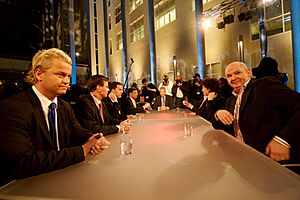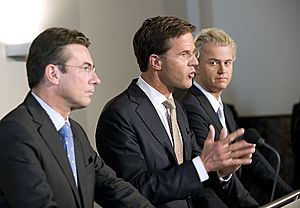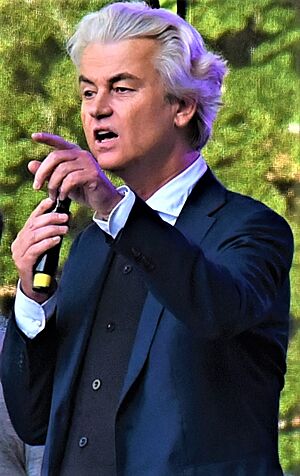Geert Wilders facts for kids
Quick facts for kids
Geert Wilders
|
|
|---|---|
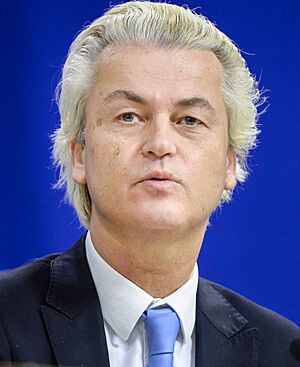
Wilders in 2015
|
|
| Leader of the Party for Freedom | |
| Assumed office 22 February 2006 |
|
| Preceded by | Position established |
| Leader of the Party for Freedom in the House of Representatives | |
| Assumed office 23 November 2006 |
|
| Preceded by | Position established |
| Member of the House of Representatives | |
| Assumed office 26 July 2002 |
|
| In office 25 August 1998 – 23 May 2002 |
|
| Personal details | |
| Born | 6 September 1963 Venlo, Netherlands |
| Political party | PVV (2006–present) |
| Other political affiliations |
|
| Spouse |
Krisztina Márfai
(m. 1992) |
| Residence | The Hague |
| Alma mater | Open University of the Netherlands |
| Signature | |
Geert Wilders (born 6 September 1963) is a Dutch politician. In 2006, he started the Party for Freedom (PVV) and has been its leader ever since. He is also the party's leader in the House of Representatives, which is part of the Dutch government.
Wilders is known for his strong opinions. He is a right-wing populist, which means he often appeals to the concerns of ordinary people. He is against a lot of immigration, has strong criticism of Islam, and is a Eurosceptic, meaning he is critical of the European Union.
His views have made him a well-known but controversial person in the Netherlands and other countries. Because of his strong statements, he has needed protection from armed police since 2004.
Contents
Early Life and Career
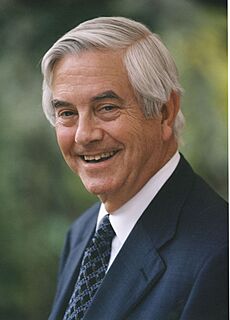
Geert Wilders was born on 6 September 1963, in Venlo, a city in the Netherlands. He was the youngest of four children and grew up in a Catholic family. His father was Dutch, and his mother was born in the Dutch East Indies (now Indonesia) and had a mixed Dutch and Indonesian background.
After finishing high school, Wilders wanted to see the world. He traveled to Israel and lived there for a year on a farm called a moshav. He also traveled to nearby Arab countries. These experiences helped shape his political ideas.
When he returned to the Netherlands, he became interested in politics. He started working as a speechwriter for the People's Party for Freedom and Democracy (VVD), a major political party. From 1990 to 1998, he was an assistant to the party's leader, Frits Bolkestein. During this time, he learned a lot about politics and developed his own views.
Political Career
In 1997, Wilders was elected to the city council of Utrecht. A year later, in 1998, he was elected to the Dutch House of Representatives. At first, he was a member of the VVD party. However, he began to disagree with his party on some important issues.
One major disagreement was about whether Turkey should be allowed to join the European Union. Wilders was strongly against it. In 2004, he left the VVD and started his own political group, which later became the Party for Freedom (PVV).
The Party for Freedom (PVV)
The Party for Freedom (PVV) had its first major election in 2006. It won 9 out of 150 seats in the House of Representatives, which was a strong start for a new party. The PVV's main goals included lowering taxes, being tougher on crime, and stopping what Wilders called the "Islamisation of the Netherlands."
Over the years, the PVV became more popular. In the 2010 election, the party grew from 9 seats to 24 seats, making it the third-largest party in the country. The PVV agreed to support the government, which was a coalition of the VVD and another party, the Christian Democratic Appeal (CDA). This meant the PVV had a lot of influence, even though it wasn't officially part of the government.
However, in 2012, Wilders withdrew his support for the government because he disagreed with its plans to cut spending. This led to a new election. In that election, the PVV lost some of its seats, going down to 15.
Recent Elections
In the 2017 general election, the PVV did very well, winning 20 seats and becoming the second-largest party. In the 2021 election, the party's support dropped slightly, and it won 17 seats.
The 2023 general election was a huge success for Wilders and the PVV. The party won 37 seats, making it the largest party in the House of Representatives for the first time. This result was a major surprise in Dutch politics.
After the election, Wilders tried to become the prime minister. However, he could not get enough support from other parties to form a government with him as leader. Instead, the PVV joined a coalition with three other parties. Dick Schoof became the prime minister, and his government started in July 2024.
Political Views
Geert Wilders sees himself as a right-wing liberal. He is inspired by former British Prime Minister Margaret Thatcher. His political ideas are a mix of different positions.
Views on Islam
Wilders is most famous for his strong criticism of Islam. He has said, "I don't hate Muslims, I hate Islam." He believes that Islam is a political ideology more than a religion. He has compared the Quran to a hateful book and has called for it to be banned in the Netherlands.
He also wants to stop immigration from Muslim countries and ban the building of new mosques. In 2008, he released a short film that showed his views on Islam. The film caused a lot of anger and criticism around the world.
Views on the European Union
Wilders is a Eurosceptic, which means he is very critical of the European Union (EU). He has called the EU a "monster in Brussels." He believes the Netherlands should have more control over its own borders, money, and laws.
For many years, he campaigned for the Netherlands to leave the EU, an idea sometimes called "Nexit." However, after the 2023 election, he agreed to pause this demand to be able to form a government with other parties.
Views on Israel
Wilders is a strong supporter of Israel. He lived there when he was young and has visited the country many times. He has said that Israel is the "first line of defence" for the Western world.
He has also made controversial statements, such as suggesting that Jordan should be renamed Palestine to create a homeland for Palestinians. This idea has been criticized by the Jordanian government.
Personal Life
Wilders is married to Krisztina Márfai, a former diplomat from Hungary. They married in 1992.
Wilders is famous for his platinum blond hair, which he has been dyeing since the 1990s. This has led to nicknames like "Mozart" and "Captain Peroxide."
Security and Protection
Because of his strong views, especially about Islam, Wilders has received many threats. Since 2004, he has been under constant police protection. He lives in a secret, heavily guarded house and is always surrounded by security officers.
This has had a big impact on his personal life. He cannot go anywhere without his security team, and his office in the parliament building is in a highly secured area. He once said that the limits on his life are "a situation that I wouldn't wish on my worst enemy."
Legal Issues
Wilders's comments have led to legal challenges. He has been taken to court in the Netherlands over accusations of hate speech.
In 2011, he was found not guilty of all charges. The court decided that his comments were part of a political debate, even if they were offensive to some.
In 2016, another trial began over comments he made about Moroccans in the Netherlands. In 2020, a court found that his remarks were insulting but were made for political reasons rather than to encourage discrimination.
International Work
Wilders has worked with politicians and groups from other countries who share his views. He has traveled to the United States, Australia, and other European countries to give speeches and show his film.
He has tried to form alliances with other right-wing populist parties in Europe, such as the National Rally in France, led by Marine Le Pen. Their goal is to work together to reduce the power of the European Union.
In 2009, he was banned from entering the United Kingdom by the British government, which said his presence could cause tension. However, a court later overturned this ban, and he has visited the UK several times since.[[Category
See also
 In Spanish: Geert Wilders para niños
In Spanish: Geert Wilders para niños


